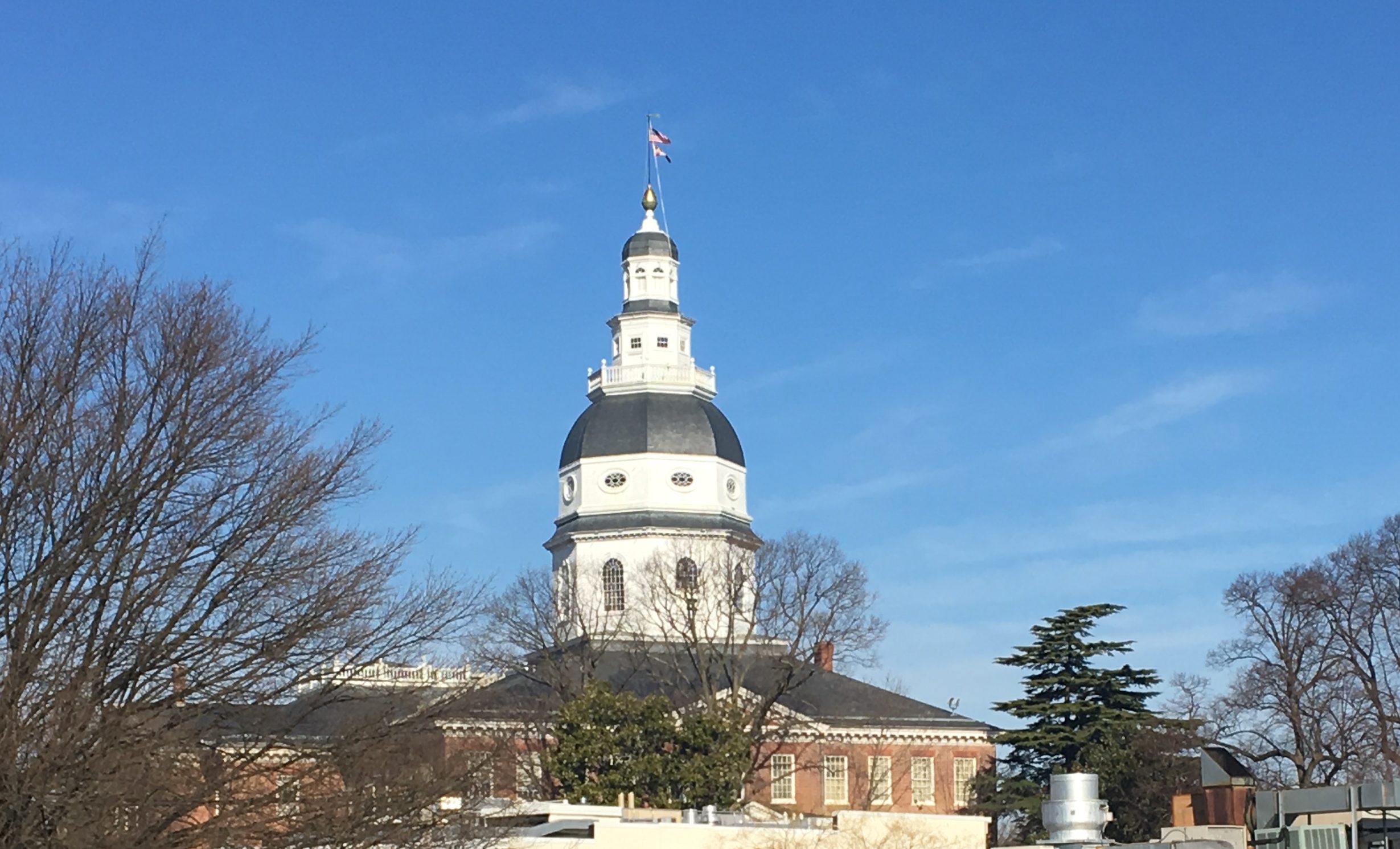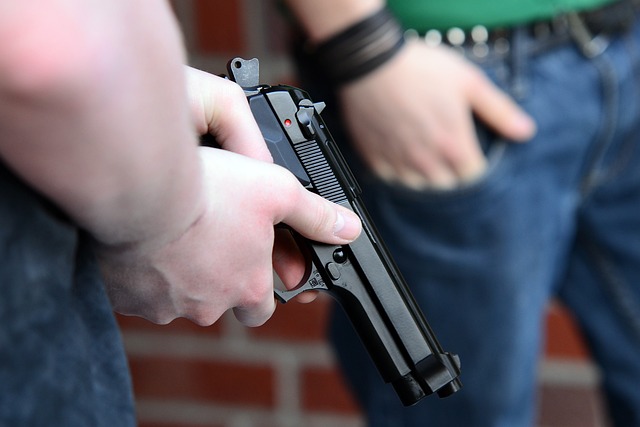Van Hollen, other Maryland Democrats and teachers slam Tennessee law arming educators
By TORRENCE BANKS
Capital News Service
WASHINGTON – Maryland federal and state lawmakers, as well as local education groups, are speaking out against allowing teachers to carry firearms in classrooms, adding that they are confident that a bill allowing such a practice won’t come to fruition in the state.
“The simple truth is that the vast majority of Americans want commonsense reforms like stronger background checks and an assault weapons ban to keep our schools safe from the epidemic of gun violence,” Sen. Chris Van Hollen, D-Maryland, said in a statement.
He added: “Despite that, some legislators continue to press for policies like this one in Tennessee to allow for concealed carry for handguns on school grounds. It’s a misguided and dangerous approach that undermines the safety and well-being of both students and educators.”
Maryland is one of 14 states and the District of Columbia to have some type of law preventing school boards from giving K-12 educators the authority to carry firearms, according to the nonprofit firearm training organization Faster Saves Lives.
Maryland law prevents anyone from carrying or possessing a firearm in public and private K-12 schools, according to the Giffords Law Center to Prevent Gun Violence, a nonprofit based in California.
The law was extended to higher education institutions in March 2023.
Tennessee is the most recent state to pass legislation in stark contrast to Maryland’s law.
Tennessee Gov. Bill Lee signed a law on April 26 allowing teachers and other school staff members to carry firearms on school grounds. The law was passed after three 9-year-old students and three adults were killed last March in a shooting by a former student at the Covenant School in Nashville, Tennessee.
“There are no circumstances where educators should carry weapons on school property,” said Cheryl Bost, president of the Maryland State Education Association. “Our educators are trained professionals in the field of education. And that’s what we want to do in our classrooms and our work sites, whether that’s bus drivers, secretaries or teachers.”
To carry firearms on school premises, Tennessee teachers still need approval from their school’s director and principal. Educators would also have to obtain a handgun permit and complete at least 40 hours of approved training from the Police Officer Standards and Training Commission in addition to the 40 hours of basic training.
“That is a pretty insignificant amount of time,” said Maryland Del. Jared Solomon, a Democrat. “Considering the amount of time that law enforcement has to train and create scenarios and figure out how to confront these kinds of situations.”
Solomon started his career as a high school teacher in Baltimore City before moving to the policy side of education. He believes that another problematic aspect of Tennessee’s bill is that it won’t allow parents to be notified if their students’ teachers are carrying guns.
“If you didn’t want your child in a classroom with a teacher that was carrying a gun, you wouldn’t have that option, which I think is not really parental choice,” Solomon said. “I know certainly, I would not want my child in a classroom where the teacher is carrying a weapon.”
Mark Pennak, president of the gun owners’ rights organization Maryland Shall Issue, doesn’t see Tennessee’s law as a problem.
Pennak believes that teachers serve as the “first line of defense for students” and that those willing to be trained and who are able to carry a gun should be allowed to.
“The whole idea of concealed carry is that the mass killer intruder does not know who is armed,” Pennak said in an email. “If the information is shared with parents, that advantage will disappear and the armed teacher would be in the same position as the uniformed school resource officer – the first target.”
Pennak added that programs, like the nonprofit organization FASTER, help train school faculty to ensure that they are not risking the students’ safety.
“Trained teachers do not put their children at risk,” Pennak said.“That is what the training is for. And any such minimal risk is far outweighed by the protection that an armed teacher can provide right at the outset of a school shooting.”
The number of school shootings in K-12 schools in the United States has increased each year from 2021 to 2023, according to the K-12 School Shooting Database created by data scientist David Riedman.
The database defines a school shooting as an incident where a “gun is fired, brandished (pointed at a person with intent), or bullet hits school property, regardless of the number of victims, time, day, or reason.”
In 2021, 256 shootings were recorded in the database. That number jumped to 308 school shootings in 2022 and 348 in 2023.
Sen. Ben Cardin, D-Maryland, said he does not believe that allowing educators and other school professionals to carry guns would solve the mass shooting epidemic in schools.
“We do not need more guns in schools, and we do not need educators and other school professionals carrying guns,” Cardin said in a statement. “Teachers are hired to teach, not be security guards. The answer to stemming the epidemic of gun violence in our schools is not to bring more guns into the schools.”
Jaime Lennon, spokeswoman for Maryland Democratic Rep. Dutch Ruppersberger, said that the possibility of a bill like Tennessee’s being introduced at the federal level is slim. Lennon added that no research suggests that arming teachers would solve the problem.
“Congressman Ruppersberger would strongly oppose it in any event, quite simply, because teachers have stated over and over that they do not want to carry guns into their classrooms,” Lennon said. “There is also zero scientific evidence that this is a realistic solution to an incredibly complex problem. If more guns equaled less violence, we would be the safest country on the globe.”
Maryland Democratic Rep. Steny Hoyer said that “Marylanders have long known that the answer to stopping mass shootings does not lie in increasing the number of firearms on American streets.”
“I’m disappointed to see this law passed in Tennessee, but I remain confident that under the leadership of Governor (Wes) Moore and our strong Democratic delegation – Maryland will continue to be a state that works towards ending gun violence once and for all,” Hoyer said.
Both Bost and Solomon said they were confident that the Maryland legislature will not allow teachers to carry guns in schools anytime soon.
“We’ve really instituted a lot of strong firearm safety standards and laws in the state that I think are a much better step forward than just saying we’re going to introduce more firearms into a school and leave that task to a teacher,” Solomon said.
Bost added that a deeper investment in school counselors and psychologists to help students deal with trauma, along with reducing class sizes to help teachers better cultivate relationships with students, could help prevent situations where students feel the need to resort to violence.
“Guns have never been, and will never be an answer, whether it’s in our society or our schools,” Bost said. “It’s actually getting into our classes and providing the resources. We are doing a good job with that here in Maryland. We can always do better.”
Maryland Del. Susan McComas, a Republican, agreed that the state would never pass a law similar to Tennessee’s legislation, adding that Maryland should consider using resources officers who can work with students.
“There are just too many what ifs and scenarios where a teacher might be attacked by a distraught student or a group of students to get the gun,” McComas said, referring to Tennessee’s law.

Capital News Service is a student-powered news organization run by the University of Maryland Philip Merrill College of Journalism. With bureaus in Annapolis and Washington run by professional journalists with decades of experience, they deliver news in multiple formats via partner news organizations and a destination Website.

